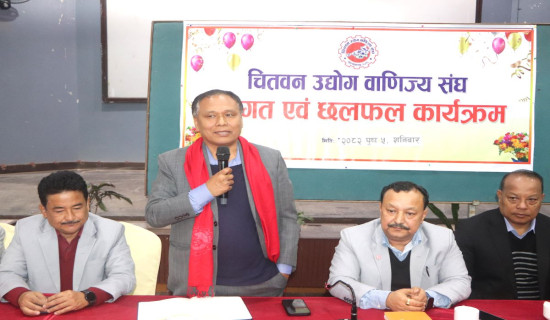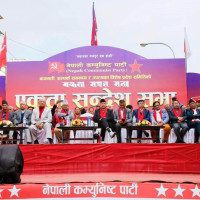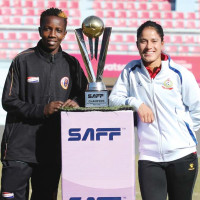- Saturday, 20 December 2025
Attention, Sports Authorities
This is an issue I have been hammering on about for five decades. As someone who debuted his journalism career with the news beat covering sports, entertainment and education, let me submit an appeal for taking into consideration the points raised in this opinion curtain-raiser. There is no reason to accept the fate that once more the National Games’ schedule is going off the track. The sad story of the all-important event gets entangled in an inability to field a crop of competent officials who can coordinate the hosts and other agencies in an orderly direction.
If uncertainty were to hit so often with such pathetic frequency, something serious is wrong. Sports lovers and athletes bear the brunt of the uncertainties the regular postponements create. Players suffer the most at the personal level. So do their coaches and teams, as well as families and well-wishers. In the dying days of December 2024, National Sports Council Member-Secretary Tanka Lal Ghising dwelt upon the “Mission-2026” goal, with an ambition to collect at least 10 medals, including a gold, in the 20th Asian Games scheduled for next year.
Ambitious mission
The three-year programme is ambitious in that never has a Nepali squad at the Asiad won so many medals. As far as a gold medal is concerned, Nepal has so far drawn a blank. Will the gaping vacuum be filled with a pleasant glitter at the multi-sport 16-day sporting spectacle scheduled for Aichi-Nagoya venue in Japan next year (September 19-October 4)? If our athletes returned home on the eve of the Dashain festival, and enabled the top officials to demonstrate what they say, it will be something of a miracle to be savoured with the greatest satisfaction in the country’s sporting history.
In 1980, Bishnu Gopal Shrestha, president of the National Weightlifting Association, proclaimed that Nepal’s national contingent at the Moscow Summer Olympics would bring home at least one medal in weightlifting. When this scribe asked him what if his hope did not materialise, he vowed to resign for the failure.
On the eve of Nepal’s contingent leaving for Moscow, this scribe analysed Shrestha’s statement for The Rising Nepal: Come the Moscow meet, and “Nepal will either have its first ever Olympic medal or the National Weightlifting Association will have a new president.” Shrestha spoke with confidence, even if it turned out to be an audacious one that has never been attained even after the quadrennial’s 11 successor editions.
Nepal returned empty-handed, as it has always been doing in the meet’s history. But Shrestha shrugged off suggestions not to resign. In a sporting gesture, he owned up to the responsibility and stepped down for failing to deliver what he had pledged. No sports official had emulated Shrestha’s pledge until Ghising last year made a vow with a three-year mission to earn no less than ten medals. It is a self-imposed tall order. Declaring it three years ahead of the big event entails a commitment to unflagging efforts.
Such a bid on such a scale of ambition and so early on from the NSC member-secretary makes people sit up with attention. Hence, there is a high degree of anticipation, speculation, and even ridicule from sceptics. Nepal’s best-ever performance was in 1986 when it bagged a glittering array of eight medals, divided equally among taekwondo players and boxers. But, releasing an annual calendar on time and sticking to it, or at least ensuring that it is followed, seems to be a more touch task than winning gold and bronze medals in an Asiad.
The mission with action should be to draw up the calendar and take action against those who fail to comply with it. Relegate them, etc. A leader that fails to meet the basic expectations deserves the sack order if the laggard seeks to drag his/her feet with no sense of accountability. Nepali Congress General Secretary Gagan Thapa said last summer: Those who fail to hold organisational meeting better stay home [quit]. Although the parliamentarian made the statement in relation to his party’s fraternal groups, it holds relevance to the national sports sector, too.
Of the more than 60 sports organisations registered, no less than 20, including some of the oldest like athletics, badminton, and table tennis, are reported not to have held even their organisational elections within the stipulated time. The NSC has withheld financial assistance to the recalcitrant bodies, but this does not deter some of them that manage to circumvent the sporting spirit, thanks to the broad regulatory mandate that prompts them to go as if it is business as usual. They collect funds from other sources to go on, raising questions on the propriety and audit.
Sustainable drive
Quite a few new ones have never graduated from their “ad hoc” status, having made no serious efforts at steering the organisations ahead soundly and properly. Many of the 60-plus associations do not even hold mandatory annual national events for their disciplines. But then the NSC, too, needs to show its prowess in governing the country’s sports sector in visible terms. For that matter, all associations and the apex bodies should shed squabbling and infuse in themselves a sense of discipline, purpose, and will to deliver.
The nation’s sporting world has been in the lurch for far too long to find any credible excuses. All officials and organisations should shape up or ship out. Posts and prestige are to be earned, not merely claimed. Budgetary limitation is an issue everywhere. If that is the chief cause of the straits that the sports sector is undergoing, then the officials should say so and prefer to quit than stay still without holding even regular competitions. The inherent power in holding an office is always there, but not so the ability to demonstrate credible performance.
Each national association should, without any excuse, host a national championship but not without first ensuring that the lower unit competitions from the district upwards culminate into the top-level meet. Merely bagging sporadic medals, if at all, will not mean nationwide sports spread and encourage truly mass participation and sustained growth of this all-important field. As for picking ten Asiad medals, including a gold, I would be more than happy with even half of Ghising’s promised delivery.
(Professor Kharel specialises in political communication.)




-square-thumb.jpg)











